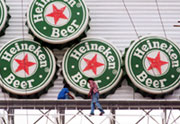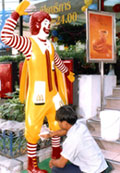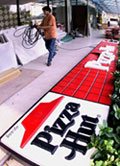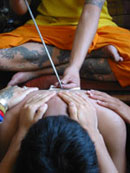Yes Ma'am, Sir
The English language as spoken in Thailand is special indeed. At first it left me scratching my head in bewilderment. I was especially confused that the majority of Thai men were calling me “sir”.
“Sawadee ka” is how a woman says hello in Thai with “Sawadee krap” being the male version. The “ka” is a speaker-based gender marker that defines a woman speaker, just as the “krap” lets the listener know the speaker is a man. Almost every sentence in Thai ends with a “ka” (for women) or a “krap” (for men) because it is the polite form of speech. I become a “sir” as the result of Thai being translated into English when a male speaker translates the “krap” on the end of his sentence.
In Thailand cross-dressing, sex changes, and open expressions of sexuality are common and accepted. This has provided many nights of hot debate as I have argued with a table of friends over whether or not our waitstaff was a man or a woman. It seems none of us have ever come to 100% agreement in these discussions. One thing I am sure of is that there is no “sir” in the “ma’am” that I am but that in Thailand a feminine male will finish a sentence with “ka” if they wish.
agreement in these discussions. One thing I am sure of is that there is no “sir” in the “ma’am” that I am but that in Thailand a feminine male will finish a sentence with “ka” if they wish.
Thai does not translate well into English because English has too many tenses, and pronunciation problems prevail. Well, I have tried to learn Thai and it was not easy for me. The fact is most Thais speak better English than the foreigners living here speak Thai so we have no right to complain. But I truly enjoy the hundreds of miscommunications that happen daily.
Thai culture does not like to use the word “no” or in general to be disagreeable. So they opt for “yes” with a smile at all times. A conversation may go as follows: “Do you speak English?” “Yes.” “Where is the bathroom?” “Yes.” The foreign visitor typically becomes highly frustrated or at times actually yells the questions again in hopes that volume alone will dissolve the language barrier. It may seem funny to point out but in Thailand people speak Thai and yelling English does not help someone learn a second language instantaneously.
point out but in Thailand people speak Thai and yelling English does not help someone learn a second language instantaneously.
Towns in Thailand that get a lot of tourist traffic have better English skills in general, but once you get way out into the country it is best to rely on the point-and-smile method for food and the hop-on-one-foot-and-smile method for the bathroom.
I am glad that English has not taken over in Thailand. There is an alarming mass of western culture here already. The western chains of supermarkets, gas stations, and convenience stores only give visitors a false sense of security. Just because someone works at a 7-eleven does not mean they speak more than a few words of English, if any.
Once while at a market in Chiang Mai I paused in front of a tea vendor to take a break from the heat and the visual overload for a moment. The sales clerk came up to me and with the nicest smile asked, “Are you interesting?” Well, it really caused me to think. I did not want to buy any tea, but am I interesting? Well, I like to think so at least.
me to think. I did not want to buy any tea, but am I interesting? Well, I like to think so at least.
Restaurant menus are cause for perpetual entertainment. With misspellings and strange translations sometimes I have ordered food simply to see what in the world I would be served. “Crush ben on bed” was offered at a restaurant in the middle of nowhere claiming to serve Mediterranean food. The black beans on pita bread were indeed quite nice. The pita bread was homemade and about six inches thick so it made for one cheap and filling meal.
Journeying into a national park one day, the sign on the way in gave me cause for alarm. It proclaimed, “The park which is closed is open.” I pondered a moment and my mind made the mental leap: Ah-hah, they mean CLOSE, as in near, and indeed close it was - just a hop, skip, and a jump away in fact.
Bumper stickers and messages on car windows can often convey confusing messages. Phrases like “SEXY ROAD”, “Love me love my dog”, and the one I saw today which filled a back window with “Blood! Colour! Water! Money!” go floating by leaving me bewildered.
Deciphering Thai-English or “thailish” can be challenging. Once I was cruising a country road at a good clip and caught a sign out of the corner of my eye. It said, “Derry Framing.” I thought, “I’ve got it! They mean dairy farming!” I felt really super smart. Only five minutes later did I realize that I was back in America for a visit and indeed, it really was a frame shop owned by the Derry family.
